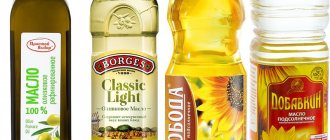general characteristics
People realized that oil can be obtained from soybeans back in the third millennium BC. And this discovery was made in Ancient China. It was there that the most ancient written references to the use of the product were found. But according to experts, there is nothing strange in this, since China (according to some sources, India) is considered the birthplace of this culture. In ancient China, soybean served as both food and medicine, and the plant itself was called divine. In those days, in the East they believed that soybean oil was the very elixir of youth that returned health, strength and beauty to a person.
Content:
- general characteristics
- Chemical composition
- Benefits for the body
- Possible harm and side effects
- Use in the food industry
- Use in cosmetology
- What else is useful
Real soybean oil has a bright straw-yellow or greenish color and a specific pungent odor. In industry, this product is obtained by pressing (mechanical method) or extraction (chemical method). The most useful is considered to be unrefined oil obtained by double pressing (cold pressing). But you need to understand that this type of product is not intended for long-term storage; it is characterized by a pungent odor and sediment. To extend the shelf life of the product, manufacturers resort to hydration, which, however, worsens the biological value of the oil. But, as a rule, what reaches the consumer is not pure oil, but refined oil - almost transparent, with a pinkish tint and without a strong aroma.
And Europeans learned about soybeans only in the 18th century. And that was first thanks to soy sauce, which the French were the first to try in Europe. Today, soybean oil is made from the fruits of a plant known in biology as soybean. It is grown mainly in tropical and subtropical regions, as well as in the Far East, Moldova, and Georgia. Soybean oil is on the list of the most popular among residents of China, Western Europe and the USA.
Compound
Soybean oil contains many vitamins and minerals, which explains its nutritional value.
| Substance name | Quantity |
| Vitamins | |
| E | 17.1 mg |
| TO | 183.9 mg |
| Minerals | |
| Zinc | 10 mcg |
| Iron | 50 mcg |
| Phosphorus | 2 mg |
| Acids | |
| Linolenic | 54% |
| Oleic | 25% |
| Stearic | up to 7% |
| Palmitic | until 6% |
| Arachinovaya | up to 2.5% |
In terms of vitamin E content, this product is one of the leaders and provides 114% of the daily requirement for tocopherol.
Soybean oil has a high calorie content - 763–900 kcal. Fats were distributed by type as follows:
- saturated - 15 g;
- polyunsaturated - 45 g;
- monounsaturated - 11 g.
Protein, carbohydrates and dietary fiber are absent here.
Chemical composition
According to scientists, soybean oil is the record holder among food products for the content of bioactive substances. But what’s most impressive is that it is almost 98% absorbed by the human body, which is a very high figure.
It is logical that soybean oil contains a huge amount of fat (thanks to them, the calorie content of 100 g of the product is almost 900 kcal). But this, it must be said, is not bad news at all. On the contrary, the “palette” of fats does not contain cholesterol, but is represented by healthy polyunsaturated fatty acids. In particular, approximately 50-60% of soybean oil consists of linoleic acid, and 20-30% of oleic acid. The product contains up to 7% stearic fatty acid, approximately 6% each of linolenic and palmitic acid. In slightly smaller quantities, scientists found arachidic, myristic and hexadecenic fatty acids in it. To summarize, 100 g of soybean oil contains 58 g of polyunsaturated fats, 23 g of monounsaturated and 16 g of saturated fatty acids. In addition, the soy product can be considered as a source of vitamins E, and, as well as iron and zinc.
Harm
Soybean oil is characterized by high calorie content, so nutritionists do not recommend consuming more than 30 ml daily.
It is not recommended to use the oil externally in its pure form due to its comedogenic effect - the product clogs pores and promotes the formation of blackheads.
Some researchers warn that long-term use may cause migraines, as this effect has been observed in soy.
Benefits for the body
Soybean oil has been used for therapeutic and prophylactic purposes for several millennia. And many of its properties attributed by traditional healers have already found scientific confirmation. For example, today it is known for sure that soy products are good for:
- prevention of atherosclerosis and heart attacks;
- strengthening the immune system;
- reducing the risk of malignant tumors;
- improving bowel function;
- reducing cholesterol in the bloodstream;
- acceleration of metabolism;
- improving blood clotting;
- strengthening the nervous system;
- preventing kidney problems;
- increasing male fertility;
- hair and skin care;
- slowing down the aging process.
By the way, soybean oil is also useful because it promotes the proper absorption of fat-soluble vitamins (, , E, K).
But if the oil is intended for internal use as a natural medicine, then its daily dose should not exceed 1-2 tablespoons.
What else is known about the benefits of soybean oil:
Regulates cholesterol levels
Cholesterol is a fat-like substance that the body needs to produce certain hormones and enzymes. The body of healthy people is able to independently produce adequate doses of this substance, sufficient to perform its functions. Poor nutrition and disruption of the digestive system lead to excessive accumulation of cholesterol in the blood vessels. And this is a serious factor that increases the risk of developing coronary heart disease. The fatty acids contained in soy products help the body control cholesterol levels and, if the permissible limits are exceeded, reduce its concentration. Thus, we can say that soy product also protects against heart attacks and strokes.
Strengthens bones
The oil gained this ability due to the presence of vitamin K. This nutrient plays an important role in maintaining healthy bone tissue. Studies have shown that vitamin K promotes bone mineralization, which prevents osteoporosis. And in addition to vitamin K, the product contains zinc and iron, which are also important for maintaining healthy bones and teeth.
Improves men's health
Soybean oil is considered beneficial for the prostate gland. Some studies indicate that consuming soy products may reduce the risk of prostate hyperplasia and cancer by up to 70%. In addition, soybean oils help restore hormonal balance in the male body.
Source of antioxidants
Free radicals, or reactive oxygen species, are typically part of normal oxygen metabolism. They are formed in the body when processing food into energy, and it must be said that in a certain amount they are even beneficial for the body. Meanwhile, poor ecology, exposure to UV radiation, tobacco smoke and other factors increase the level of free radicals in the body, resulting in irreversible damage to cells and cell membranes. Therefore, a person needs substances that resist the aggressive effects of reactive oxygen species. And these substances are antioxidants. Vitamin E contained in soybean oil is one of them. Sufficient consumption of this nutrient prevents the excessive formation of free radicals, and also prevents diseases caused by them (including cardiovascular diseases, cancer). In addition, vitamin E effectively strengthens the immune system, promotes the formation of red blood cells and improves the absorption of vitamin K. And soybean oil can serve as an excellent source of the antioxidant vitamin.
Benefit
Soybean oil is worth including in your diet. One of the reasons is that it is almost 100% absorbed by the body, having a beneficial effect on it as a whole.
Scientists have proven that regular consumption of soy fat reduces the likelihood of developing a heart attack by 6 times, improves the functioning of the heart, blood vessels, and liver, and prevents diseases of these organs. This is an excellent prevention of cancer. The product normalizes metabolism and improves the functioning of the digestive tract.
The composition includes linolenic acid, which belongs to the class of omega-6 unsaturated acids. These substances are responsible for the normal functioning of cellular and intercellular membranes. It also contains a large amount of tocopherol - vitamin E, which improves reproductive function, activates blood circulation in the vessels, and prevents the formation of clots (thrombi).
Other beneficial properties of soybean oil:
- reducing blood cholesterol levels and preventing the development of atherosclerosis, which provokes dangerous cardiovascular pathologies;
- counteracting free radicals that cause oxidative processes in the body;
- immunomodulatory effect;
- normalization of the nervous system;
- help with chronic fatigue syndrome;
- reducing the risk of developing iron deficiency anemia;
- neutralization of the consequences of stressful situations;
- restoration of blood clotting processes.
Soybean oil is recommended to be included in the diet of patients with diabetes and overweight people. It is useful for people engaged in mental work: its components stimulate brain activity.
This product also has benefits for children, in whom the product promotes the normal development of the nervous system, strengthens the visual apparatus, and prevents respiratory diseases.
Fats extracted from soybeans are also used in cosmetology - for dry and normal skin, loss of tone, and wrinkles. They nourish, moisturize, soften, and form a barrier on the surface of the epidermis that protects against moisture loss and aggressive environmental influences. The product also improves the condition of dry hair.
Possible harm and side effects
In addition to the benefits, soybean oil can also cause harm to the body. For example, this product is strictly prohibited for people who are allergic to soy. There is an opinion that soy product is undesirable in the diet of pregnant and lactating women, since it contains many estrogen-like isoflavones. And some researchers suggest that migraine attacks may occur with the consumption of soybean oil. Well, don’t forget about excessive weight, which is also inevitable if you get too carried away with this high-calorie product.
Another fact that makes researchers wary of soybean oil is its high omega-6 fat content. Excess of these fatty acids in the body can cause inflammation and chronic diseases.
The most dangerous is the oil obtained from genetically modified beans. Such a product, as a rule, contains many components hazardous to humans. For example:
- goitrogens - substances that block the synthesis of thyroid hormones (produced by the thyroid gland) and interfere with the metabolism of iodine;
- genistein and daidzein are phytoestrogens that can disrupt the endocrine system, cause infertility, and promote breast cancer;
- phytic acid – impairs the body’s absorption of magnesium, iron, zinc, calcium and some other useful minerals (soybeans are the leader among all legumes in phytate content; their concentration can be reduced by long-term heat treatment);
- hemagglutinin - causes red blood cells to stick together.
Harm and contraindications of soybean oil
Soybean seeds and products made from them are among the most common food allergens .
People with hypersensitivity should limit their intake of soybean oil or eliminate it from their diet altogether. In other cases, this product is not harmful. Soybean oil is widely used as a healthy food. If there are no significant contraindications, you can safely replace sunflower or olive oil with this product without worrying that it will in any way harm the body. Share your experience using soybean oil the comments
Use in the food industry
Soybean oil is one of the leaders in use in the food industry. It ends up in the kitchen either in liquid form (refined) or as a component of margarines. This oil can often be seen in the ingredient list of many products, including confectionery, mayonnaise, salad dressings, and soy milk. In addition, it is used as a stabilizer and preservative in canned food, as well as for processing products before freezing.
According to the rules, a vessel with soybean oil should be stored in the refrigerator. Under the influence of the sun, its beneficial properties are reduced. In addition, the soy product is not intended for long-term storage (maximum a month), so it is better to buy in small portions.
Applications of soybean oil
Soybean oil is actively used in aromatherapy, traditional medicine, cooking, and cosmetology. For the treatment and prevention of vascular diseases, including atherosclerosis, liver, kidneys, brain, cancer and gastrointestinal disorders, as well as metabolic disorders, soybean oil is prescribed in an amount of 10 ml per day (2 teaspoons).
The oil is best used as a savory dressing for cold appetizers.
Use in cooking
In the food industry, margarine is made from soybean oil. Soybean oil is universal and suitable for any culinary delight. Meat and fish are fried in refined soybean oil; it is added as the main ingredient in the production of cold and hot sauces, such as mayonnaise.
Soybean oil surprisingly gently enhances the taste of vegetable salads and harmonizes with rice, eggs, and seafood, such as seaweed. The product is added to baked goods, which acquires an amazing golden color.
A very popular product and its properties – Soy sauce benefits and harms
The use of soybean oil in cosmetology
Phytosterols, valuable lipids, fatty acids, vitamins and powerful antioxidants make soybean oil indispensable in cosmetology. The healing components of the oil have a positive effect on the regeneration processes of skin tissue.
Cosmetics manufacturers successfully use soybean oil to make detergents and soaps, and also add it to the formulation of face and body lotions, scrubs, cleansers, creams, nourishing masks and hair balms.
At home, using soybean oil, it is recommended to remove cosmetics and cleanse the skin before bed, apply the product in pure form or, enriched with medicinal esters, on the face as a night and day cream.
The oily elixir is used to lubricate the lips, rough skin of the elbows and knees, and heels, especially when the epidermis is thickened. Soybean oil is an excellent plant base for homemade cosmetics, massage compositions, and masks.
Use in cosmetology
Best materials of the month
- Why you can't go on a diet on your own
- 21 tips on how to avoid buying stale food
- How to keep vegetables and fruits fresh: simple tricks
- How to curb your sweet cravings: 7 unexpected products
- Scientists say youth can be extended
Many centuries ago, soy products were used as a natural cosmetic product. This fatty oil has many benefits for dry and normal skin. It moisturizes and nourishes it, creates a protective barrier on the epidermis that helps retain moisture. Soybean oil-based products are useful for caring for very dry, chapped and rough skin. This vitamin E-rich product is important to include in your aging skin care program. It will help keep your face toned, slow down aging, and restore the natural color and smoothness of the skin. Researchers have found lecithin in soybean oil, which is extremely important for the skin, especially for dermatitis. In addition, soybean oil is useful to apply to insect bites to get rid of itching and swelling.
However, the use of soybean oil can also cause unpleasant side effects in the form of comedones (black spots on the skin). This most often occurs as a result of using an undiluted soy product. Therefore, for the face it is better to take a mixture of oils, for example from soybeans, olives, almond and peach kernels, pine nuts and other plants. Soybean oil, a few drops, can be added to ready-made commercial creams, lotions for face and body, and makeup remover milk.
Soy product is also useful for accelerating hair growth. It is useful to add a few drops of essential oils important for hair (for example, peppermint, lavender or rosemary) to the oil base. The mixture is applied to the scalp, then wrapped in polyethylene and a warm towel.
Soybean oil for face
It is advisable to use recipes for facial care compositions based on soybean oil. The product has gained popularity as a product that can retain healing moisture in the epidermis, nourish the deep layers, renew cells, improve skin metabolism and rejuvenate the skin.
The oil is well suited for restoring combination, dry, chapped and flaky skin, qualitatively softening the epidermis and creating an additional protective layer from negative environmental factors. According to reviews from experienced cosmetologists, soybean oil effectively strengthens the skin.
Rejuvenating face mask
Boil the potato tuber in its “jacket”, peel and mash with a fork, mix with finely grated apple and soybean oil (15 ml). The mixture is applied to the face for 20 minutes, after which it is removed with a towel moistened with warm water.
What else is useful
We have already said that soybean oil contains lecithin. And this feature made it possible to use the soy product in pharmacology. The oil is also beneficial in soap making, in the production of detergents, plastics, dyes, and synthetic oils. And not so long ago, researchers discovered that soy product in its pure form (as, by the way, rapeseed) is an excellent tool for controlling garden pests.
Scientific debate on the benefits and harms of soybean oil has been going on for several years. One group of scientists claims that it is one of the healthiest products, while others argue that, apart from its low cost, there is no other reason to use soybean oil in food. Which of them is right will probably be judged by time and subsequent research into the beneficial and dangerous properties of this product. In the meantime, we can only say with confidence that it, like other oils, should be consumed in moderation. After all, even the healthiest foods in excessive quantities can cause harm.
More fresh and relevant information about health on our Telegram channel. Subscribe: https://t.me/foodandhealthru
We will be grateful if you use the buttons:
Benefits and possible harms of soybean oil: advantages and disadvantages
The benefits of soybean oil are determined by its rich composition of vitamins. Eating it has a positive effect on the condition of the entire human body. Regular consumption of soybean oil:
- Reduces the risk of developing cancer, minimizes the likelihood of heart failure and other heart diseases.
- The acids present in the product help improve the functioning of the heart muscle, liver, and intestines.
- Improves mental activity, prevents the development of dementia (Alzheimer's disease).
- Helps in the fight against diseases such as atherosclerosis and normalizes cholesterol levels in the blood.
- Brings the metabolic process back to normal and strengthens the immune system.
- Improves seminal fluid production in males.
The possible disadvantages of soybean oil are practically absent, but the advantages are difficult to overestimate. It is not recommended for use by women expecting the birth of a child or nursing mothers, as well as people with hypersensitivity to its components. Indeed, soybean oil can cause probable harm only if the recommended dose is exceeded or if its individual components are not taken. It is not recommended to use the product during severe migraine attacks. Unfortunately, the majority of the total volume of soybeans grown is the result of the painstaking work of genetic scientists. Therefore, if you are wary and distrustful of genetically modified food products, then it is better to avoid soybean oil.
For cooking, unrefined and refined soybean oil is almost always used, and in cosmetology, deodorized oil appears more often; it is not flavored and tasteless. Only fresh oil should be used for cosmetic purposes or in cooking. It has a short shelf life, like many others. Therefore, when purchasing a soy product, you need to pay close attention to the date of production and the conditions under which it was stored. High-quality oil should have a transparent color without sediment or sediment.
How to choose
It is advisable that the oil be packaged in a dark glass bottle, which slows down oxidative processes and protects from ultraviolet radiation.
Unrefined soybean oil is brown-green in color. It has a specific taste, maybe with a fishy, herbal, or bean undertone. To improve the taste, the product is subjected to additional processing: using special technologies, the excess acid responsible for this deficiency is removed from the composition, or the hydrogenation method is used. Refined oil has a pleasant taste and no odor.
How to use it in cooking
There are different types of oil suitable for cooking: refined and unrefined.
The main rule: you need to buy a fresh product and use it before the expiration date. Low-quality or expired oil will not be transparent; a cloudy sediment and additional impurities will be visible in the bottle.
The culinary uses of the product are very diverse.
Soybean oil in health recipes
In addition to being particularly nutritious, the product has a healing effect on the entire body. Such characteristics could not go unnoticed in folk medicine.
In many Asian countries, back in ancient times, soy was recognized as an effective medicine against anemia, nervous disorders and problems with potency.
Oil-based preparations are presented in official medicine in China, Japan and Vietnam.
In our country, experienced healers recommend drinking 2 teaspoons of a healthy product daily for:
- reduced immunity;
- elevated cholesterol levels;
- atherosclerosis or for its prevention;
- pathologies of the liver and kidneys;
- brain diseases;
- stomach ulcers, chronic gastrointestinal diseases;
- failures in metabolic processes;
- headaches;
- decreased libido;
- painful periods;
- cold;
- tendency to obesity.










